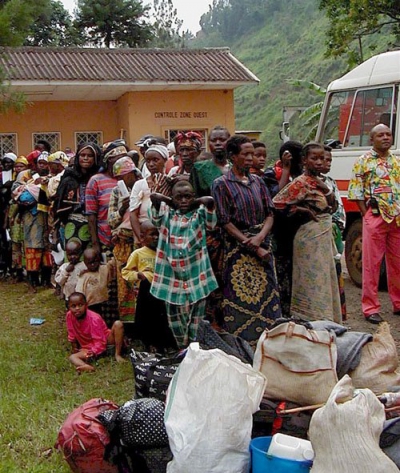The Transitional Government of the Democratic Republic of Congo was tasked with moving from the state riven by the Second Congo War (19982003) to a government based upon a constitution agreed on by consensus. In 2001, President Laurent Kabila was assassinated, and his son Joseph Kabila was named head of state.
The Second Congo War (also known as the Great War of Africa or the Great African War, and sometimes referred to as the African World War) began in the Democratic Republic of the Congo in August 1998, little more than a year after the First Congo War, and involved some of the same issues. The war officially ended in July 2003, when the Transitional Government of the Democratic Republic of the Congo took power. Although a peace agreement was signed in 2002, violence has continued in many regions of the country, especially in the east. Hostilities have continued since the ongoing Lord's Resistance Army insurgency, and the Kivu and Ituri conflicts.
Ultimately, nine African countries and around twenty-five armed groups became involved in the war. By 2008, the war and its aftermath had caused 5.4 million deaths, principally through disease and starvation, making the Second Congo War the deadliest conflict worldwide since World War II. Another 2 million were displaced from their homes or sought asylum in neighboring countries.Despite a formal end to the war in July 2003 and an agreement by the former belligerents to create a government of national unity, 1,000 people died daily in 2004 from easily preventable cases of malnutrition and disease. Major funding for this war, and for subsequent fighting, came from conflict minerals.

2002Dec, 17
Second Congo War: The Congolese parties of the Inter Congolese Dialogue sign a peace accord which makes provision for transitional governance and legislative and presidential elections within two years.
Choose Another Date
Events on 2002
- 16Jan
Osama bin Laden
The UN Security Council unanimously establishes an arms embargo and the freezing of assets of Osama bin Laden, al-Qaeda, and the remaining members of the Taliban. - 4Apr
Angolan Civil War
The Angolan government and UNITA rebels sign a peace treaty ending the Angolan Civil War. - 14Apr
Hugo Chávez
Venezuelan President Hugo Chávez returns to office two days after being ousted and arrested by the country's military. - 12May
Fidel Castro
Former US President Jimmy Carter arrives in Cuba for a five-day visit with Fidel Castro, becoming the first President of the United States, in or out of office, to visit the island since Castro's 1959 revolution. - 20Aug
Saddam Hussein
A group of Iraqis opposed to the regime of Saddam Hussein take over the Iraqi Embassy in Berlin, Germany for five hours before releasing their hostages and surrendering.

 English
English  español
español  français
français  português
português  русский
русский  العربية
العربية  简体中文
简体中文 